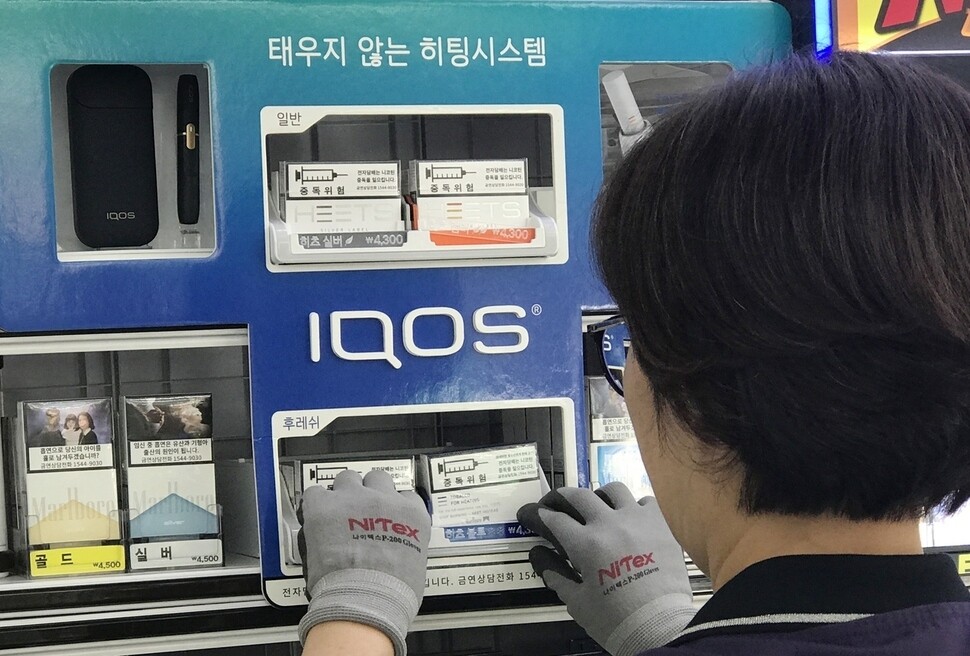hankyoreh
Links to other country sites 다른 나라 사이트 링크
Study finds electronic tobacco devices emit more tar than regular cigarettes

A South Korean government study has found that some heat-not-burn tobacco devices that are being sold in South Korea contain more tar, a harmful substance, than ordinary cigarettes.
On June 7, South Korea’s Ministry of Food and Drug Safety (MFDS) released the findings of an analysis of 11 harmful ingredients, including nicotine and tar, in the smokeless cigarettes released by three companies: IQOS by Philip Morris Korea, Glo by British American Tobacco and Lil by KT&G.
In a three-day analysis consisting of three tests per day (in line with the standards of the International Organization for Standardization), the Testing Analysis and Assessment Committee, which is composed of experts in tobacco and environmental analysis, found that IQOS and Lil cigarettes emitted an average of 9.3mg and 9.1mg of tar, respectively. That was higher than the tar content (4.3–5.8mg) of the five kinds of ordinary cigarettes most commonly sold in the country.
“There are no grounds for arguing that heat-not-burn tobacco devices are less harmful than ordinary cigarettes. However, ordinary cigarettes and heat-not-burn tobacco devices may include different kinds of tar, which limits the utility of comparing harmfulness based on the detected amount,” the MFDS said, based on its analytical findings.
These three products had a similar average nicotine content to ordinary cigarettes. When analysts scanned for nine substances other than nicotine and tar that the World Health Organization advises people to reduce their intake of, including Group 1 carcinogens, eight of those substances (all except for 1,3-Butadiene) were detected. On average, the content of these eight substances was lower than in regular cigarettes.
Philip Morris Korea argued that the MFDS’s analytical findings “demonstrate once again our basic research findings that these products contain fewer harmful materials [than regular cigarettes].”
By Park Hyun-jung, staff reporter
Please direct comments or questions to [english@hani.co.kr]

Editorial・opinion
![[Column] Season 2 of special prosecutor probe may be coming to Korea soon [Column] Season 2 of special prosecutor probe may be coming to Korea soon](https://flexible.img.hani.co.kr/flexible/normal/500/300/imgdb/original/2024/0426/3317141030699447.jpg) [Column] Season 2 of special prosecutor probe may be coming to Korea soon
[Column] Season 2 of special prosecutor probe may be coming to Korea soon![[Column] Park Geun-hye déjà vu in Yoon Suk-yeol [Column] Park Geun-hye déjà vu in Yoon Suk-yeol](https://flexible.img.hani.co.kr/flexible/normal/500/300/imgdb/original/2024/0424/651713945113788.jpg) [Column] Park Geun-hye déjà vu in Yoon Suk-yeol
[Column] Park Geun-hye déjà vu in Yoon Suk-yeol- [Editorial] New weight of N. Korea’s nuclear threats makes dialogue all the more urgent
- [Guest essay] The real reason Korea’s new right wants to dub Rhee a founding father
- [Column] ‘Choson’: Is it time we start referring to N. Korea in its own terms?
- [Editorial] Japan’s rewriting of history with Korea has gone too far
- [Column] The president’s questionable capacity for dialogue
- [Column] Are chaebol firms just pizza pies for families to divvy up as they please?
- [Column] Has Korea, too, crossed the Rubicon on China?
- [Correspondent’s column] In Japan’s alliance with US, echoes of its past alliances with UK
Most viewed articles
- 1‘We must say no’: Seoul defense chief on Korean, USFK involvement in hypothetical Taiwan crisis
- 2N. Korean delegation’s trip to Iran shows how Pyongyang is leveraging ties with Moscow
- 3[Column] Season 2 of special prosecutor probe may be coming to Korea soon
- 4‘Weddingflation’ breaks the bank for Korean couples-to-be
- 5[Column] Has Korea, too, crossed the Rubicon on China?
- 6[Editorial] New weight of N. Korea’s nuclear threats makes dialogue all the more urgent
- 7[Reportage] On US campuses, student risk arrest as they call for divestment from Israel
- 8Korea sees more deaths than births for 52nd consecutive month in February
- 9[Column] Park Geun-hye déjà vu in Yoon Suk-yeol
- 10[Guest essay] The real reason Korea’s new right wants to dub Rhee a founding father